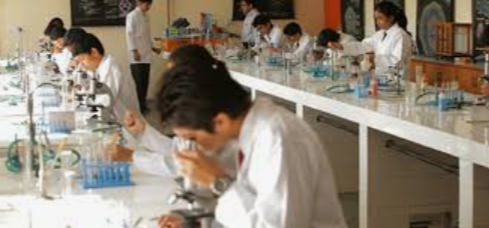Your A+ Grade Awaits at Academiascholars.com
Essays
Assignments
Term paper
Homework
Dissertations
HOW TO WRITE A LAB REPORT
The process of scientific inquiry is often considered incomplete unless a technical report detailing the procedures and findings is presented. This has made scientific reporting a much sought-after skill. Many disciplines, especially in the Natural Sciences involve the writing of laboratory reports, an official write-up containing findings from practical assessments in the laboratory. This article presents valuable information on how to prepare a practical report and guidelines to help you attain the highest score.
Why Write a Lab Report
The purpose of a lab report is to report key findings of your experiment or practical work to facilitate understanding and application of your results. The report should also contain recommendations for further research or improvement of the experiment that yielded the results.
The targets of Lab reports are people with a background in a science discipline but were not involved in the experiment.
To write a successful practical report you should have clearly defined objectives. Well-crafted objectives are essential for quality outcomes. It should be developed with the main purpose of the report in mind. A good lab report should highlight the objectives, procedures, results, and conclusions from a laboratory practical session. The report should also outline the methods that led to the findings.
The report should be credible enough to stand as a sovereign record that can be adopted without extra modification.
Similar to ordinary reports, laboratory reports, should be written according to the needs of the audience. You should reflect on their level of competence, and what they already know. You should also anticipate their needs to address their interests effectively.
Similarly, your report should provide background information on previous studies (or theory), the procedures, the findings, and the analysis of results. While the outline and organization of technical reports have changed over time, they should follow a logical progression. Slight variations are acceptable, but are contingent on what is being investigated. Yet, scientific reports remain markedly similar in structure.

General Guidelines for Writing Your Report
A formal lab report can be produced as long as you adhere to a set of guidelines. These are briefly highlighted:
Be precise
Your paper should be precise and to the point. However, the report should be comprehensive, nonrepetitive, clear, and expressed in the third person. You should avoid using words such as “I” or “we” (which are in the first person) in your procedure. For instance, instead of writing, “I measured 25 mL of peroxide..,” the procedure should be phrased, “25 mL of peroxide was measured…” While this has proven difficult for most students, scientific reporting is a skill that you should develop through constant practice.
Use correct verb tense
The report should also be written using suitable verb tenses. This is an area where many students struggle and verb tense confusion is common in many reports. However, you can avoid these problems by adhering to the following guidelines:
Remember that by the time get to the report, the experiment will have been done, so, it makes perfect sense to write in the past tense. Your report should read, “The objective of this investigation was …” and so on.
Prepare for Lab Work
Every investigation preceded with adequate preparation. The best way to prepare for the experiment is to familiarize yourself with the laboratory manual. Your preparation should also include a clear statement of the purpose, hypothesis, and a broad blueprint for the method you will deploy during the experiment. A clear knowledge of activities, you will undertake from the start, will pave the way for you to put down important notes for the final report. This should also be the basis of effective laboratory notes.

Prepare lab Notes
Laboratory notes are essential for the actual writing of the report. Effective notes should capture every critical finding and observation during the investigation. However, this will not be possible if you don’t have the necessary materials, reagents, apparatus, and tools. You should also take special note of unusual observations made in the course of the experiment.
The notes should be written clearly and arranged to facilitate the review and inclusion into the report. Where large volumes of data are involved, it is recommended that you order your results in tables. Laboratory notebooks are a great way to track the progress of the experiment and ensure that critical details are captured.
Do not duplicate the Lab manual
The laboratory manual is an informative source of information for your report. It outlines the theoretical background, procedure, and objectives of the practical. However, as useful as it is, uncritical duplication of the manual in the report is strongly discouraged. Reliance on it should be limited to the procedure and objectives of the experiment, which you should rephrase. Rewording relevant parts of the manual is sufficient proof that you are in control of your work.
Enter Results Correctly
The ultimate aim of the experiment is to obtain credible results for future use. As such, the “findings” section should emphasize what was actually observed, and not predictions from theory. Any deviations from theory should be noted and explained in the analysis section.
As important as findings are, students should know that course Instructors are trained to pay close attention to your level of understanding of the experiment will ignore results that are inconsistent with the circumstances of the investigation. With this in mind, a good student should repel the urge to falsify results. For grading purposes, you stand to gain more by highlighting the causes of deviances (from theoretical expectations) and offering improvements for the experiment to prevent such outcomes in the future.
Cite your Sources Correctly
As a scientific write-up, your report should be backed by peer-reviewed material. The background to the study should be obtained from reliable sources. Online sources can be a source of useful information. However, the sources should be restricted to pdf documents from websites with .edu, .org, or .gov extensions.
On the other hand, private sites with questionable URLs, especially the ones that contain the .com extensions should be avoided. Books are acceptable as long as they are limited to the theoretical aspects of the experiments.
In conclusion, your report should be guided by a clear set of objectives. If you can report your findings in a way that is appropriate for your audience, then you can rest assured that your report will attract lots of positive reviews.
Incase you need more clarity and maybe have someone do a personalised Lab report for you, try Best writing services 2021 review. They can be of help.
Experienced writers are ready to handle your paper
Essential Tips for Success in ATI-TEAS Test
The ATI-TEAS Test, also known as the Test of Essential Academic Skills, is a crucial hurdle for aspiring nurses and other healthcare professionals. It's a standardized exam designed to assess your readiness for health science programs by evaluating your skills in...
College Assignments: A Guide to Common Types and Success Strategies
Navigating the world of higher education can feel like traversing a complex labyrinth. Amongst the new social dynamics, independent living, and challenging coursework, one thing remains a constant: college assignments. These tasks, designed to assess your...
AI Essay Writer: A Guide to Writing Essays with AI
Artificial Intelligence (AI) is rapidly transforming various aspects of our lives, and academic writing is no exception. While the idea of using AI to write essays might initially raise ethical questions, the reality is that AI tools, when used responsibly and...








 Hi, how can I help?
Hi, how can I help?